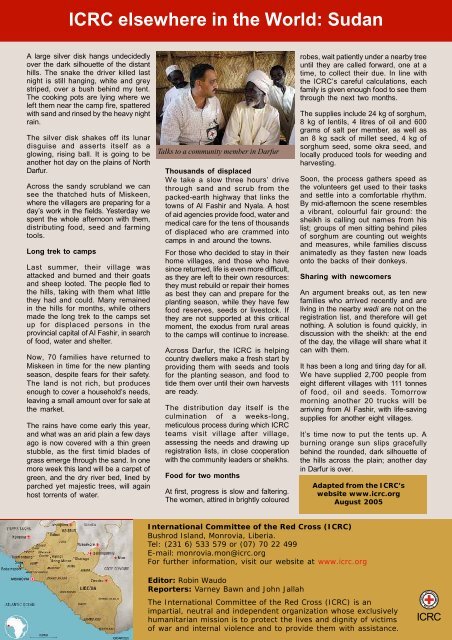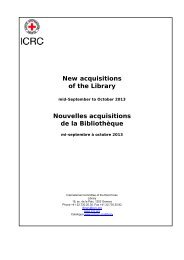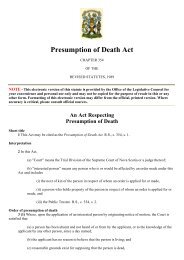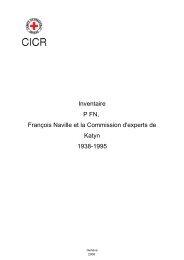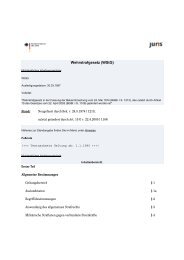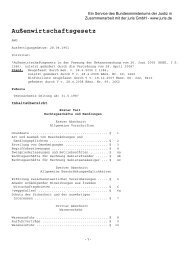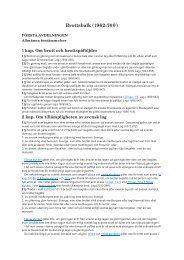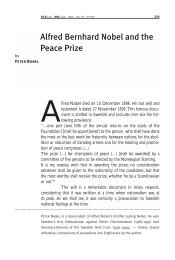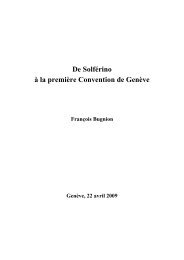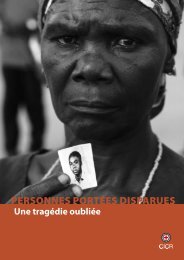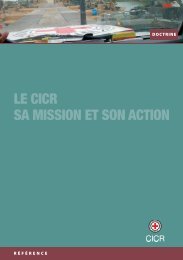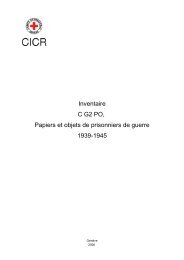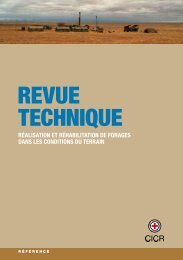ICRC Liberia newsletter - International Committee of the Red Cross
ICRC Liberia newsletter - International Committee of the Red Cross
ICRC Liberia newsletter - International Committee of the Red Cross
You also want an ePaper? Increase the reach of your titles
YUMPU automatically turns print PDFs into web optimized ePapers that Google loves.
<strong>ICRC</strong> elsewhere in <strong>the</strong> World: Sudan<br />
A large silver disk hangs undecidedly<br />
over <strong>the</strong> dark silhouette <strong>of</strong> <strong>the</strong> distant<br />
hills. The snake <strong>the</strong> driver killed last<br />
night is still hanging, white and grey<br />
striped, over a bush behind my tent.<br />
The cooking pots are lying where we<br />
left <strong>the</strong>m near <strong>the</strong> camp fire, spattered<br />
with sand and rinsed by <strong>the</strong> heavy night<br />
rain.<br />
The silver disk shakes <strong>of</strong>f its lunar<br />
disguise and asserts itself as a<br />
glowing, rising ball. It is going to be<br />
ano<strong>the</strong>r hot day on <strong>the</strong> plains <strong>of</strong> North<br />
Darfur.<br />
Across <strong>the</strong> sandy scrubland we can<br />
see <strong>the</strong> thatched huts <strong>of</strong> Miskeen,<br />
where <strong>the</strong> villagers are preparing for a<br />
day’s work in <strong>the</strong> fields. Yesterday we<br />
spent <strong>the</strong> whole afternoon with <strong>the</strong>m,<br />
distributing food, seed and farming<br />
tools.<br />
Long trek to camps<br />
Last summer, <strong>the</strong>ir village was<br />
attacked and burned and <strong>the</strong>ir goats<br />
and sheep looted. The people fled to<br />
<strong>the</strong> hills, taking with <strong>the</strong>m what little<br />
<strong>the</strong>y had and could. Many remained<br />
in <strong>the</strong> hills for months, while o<strong>the</strong>rs<br />
made <strong>the</strong> long trek to <strong>the</strong> camps set<br />
up for displaced persons in <strong>the</strong><br />
provincial capital <strong>of</strong> Al Fashir, in search<br />
<strong>of</strong> food, water and shelter.<br />
Now, 70 families have returned to<br />
Miskeen in time for <strong>the</strong> new planting<br />
season, despite fears for <strong>the</strong>ir safety.<br />
The land is not rich, but produces<br />
enough to cover a household’s needs,<br />
leaving a small amount over for sale at<br />
<strong>the</strong> market.<br />
The rains have come early this year,<br />
and what was an arid plain a few days<br />
ago is now covered with a thin green<br />
stubble, as <strong>the</strong> first timid blades <strong>of</strong><br />
grass emerge through <strong>the</strong> sand. In one<br />
more week this land will be a carpet <strong>of</strong><br />
green, and <strong>the</strong> dry river bed, lined by<br />
parched yet majestic trees, will again<br />
host torrents <strong>of</strong> water.<br />
Talks to a community member in Darfur<br />
Thousands <strong>of</strong> displaced<br />
We take a slow three hours’ drive<br />
through sand and scrub from <strong>the</strong><br />
packed-earth highway that links <strong>the</strong><br />
towns <strong>of</strong> Al Fashir and Nyala. A host<br />
<strong>of</strong> aid agencies provide food, water and<br />
medical care for <strong>the</strong> tens <strong>of</strong> thousands<br />
<strong>of</strong> displaced who are crammed into<br />
camps in and around <strong>the</strong> towns.<br />
For those who decided to stay in <strong>the</strong>ir<br />
home villages, and those who have<br />
since returned, life is even more difficult,<br />
as <strong>the</strong>y are left to <strong>the</strong>ir own resources:<br />
<strong>the</strong>y must rebuild or repair <strong>the</strong>ir homes<br />
as best <strong>the</strong>y can and prepare for <strong>the</strong><br />
planting season, while <strong>the</strong>y have few<br />
food reserves, seeds or livestock. If<br />
<strong>the</strong>y are not supported at this critical<br />
moment, <strong>the</strong> exodus from rural areas<br />
to <strong>the</strong> camps will continue to increase.<br />
Across Darfur, <strong>the</strong> <strong>ICRC</strong> is helping<br />
country dwellers make a fresh start by<br />
providing <strong>the</strong>m with seeds and tools<br />
for <strong>the</strong> planting season, and food to<br />
tide <strong>the</strong>m over until <strong>the</strong>ir own harvests<br />
are ready.<br />
The distribution day itself is <strong>the</strong><br />
culmination <strong>of</strong> a weeks-long,<br />
meticulous process during which <strong>ICRC</strong><br />
teams visit village after village,<br />
assessing <strong>the</strong> needs and drawing up<br />
registration lists, in close cooperation<br />
with <strong>the</strong> community leaders or sheikhs.<br />
Food for two months<br />
At first, progress is slow and faltering.<br />
The women, attired in brightly coloured<br />
robes, wait patiently under a nearby tree<br />
until <strong>the</strong>y are called forward, one at a<br />
time, to collect <strong>the</strong>ir due. In line with<br />
<strong>the</strong> <strong>ICRC</strong>’s careful calculations, each<br />
family is given enough food to see <strong>the</strong>m<br />
through <strong>the</strong> next two months.<br />
The supplies include 24 kg <strong>of</strong> sorghum,<br />
8 kg <strong>of</strong> lentils, 4 litres <strong>of</strong> oil and 600<br />
grams <strong>of</strong> salt per member, as well as<br />
an 8 kg sack <strong>of</strong> millet seed, 4 kg <strong>of</strong><br />
sorghum seed, some okra seed, and<br />
locally produced tools for weeding and<br />
harvesting.<br />
Soon, <strong>the</strong> process ga<strong>the</strong>rs speed as<br />
<strong>the</strong> volunteers get used to <strong>the</strong>ir tasks<br />
and settle into a comfortable rhythm.<br />
By mid-afternoon <strong>the</strong> scene resembles<br />
a vibrant, colourful fair ground: <strong>the</strong><br />
sheikh is calling out names from his<br />
list; groups <strong>of</strong> men sitting behind piles<br />
<strong>of</strong> sorghum are counting out weights<br />
and measures, while families discuss<br />
animatedly as <strong>the</strong>y fasten new loads<br />
onto <strong>the</strong> backs <strong>of</strong> <strong>the</strong>ir donkeys.<br />
Sharing with newcomers<br />
An argument breaks out, as ten new<br />
families who arrived recently and are<br />
living in <strong>the</strong> nearby wadi are not on <strong>the</strong><br />
registration list, and <strong>the</strong>refore will get<br />
nothing. A solution is found quickly, in<br />
discussion with <strong>the</strong> sheikh: at <strong>the</strong> end<br />
<strong>of</strong> <strong>the</strong> day, <strong>the</strong> village will share what it<br />
can with <strong>the</strong>m.<br />
It has been a long and tiring day for all.<br />
We have supplied 2,700 people from<br />
eight different villages with 111 tonnes<br />
<strong>of</strong> food, oil and seeds. Tomorrow<br />
morning ano<strong>the</strong>r 20 trucks will be<br />
arriving from Al Fashir, with life-saving<br />
supplies for ano<strong>the</strong>r eight villages.<br />
It’s time now to put <strong>the</strong> tents up. A<br />
burning orange sun slips gracefully<br />
behind <strong>the</strong> rounded, dark silhouette <strong>of</strong><br />
<strong>the</strong> hills across <strong>the</strong> plain; ano<strong>the</strong>r day<br />
in Darfur is over.<br />
<strong>International</strong> <strong>Committee</strong> <strong>of</strong> <strong>the</strong> <strong>Red</strong> <strong>Cross</strong> (<strong>ICRC</strong>)<br />
Bushrod Island, Monrovia, <strong>Liberia</strong>.<br />
Tel: (231 6) 533 579 or (07) 70 22 499<br />
E-mail: monrovia.mon@icrc.org<br />
For fur<strong>the</strong>r information, visit our website at www.icrc.org<br />
Editor: Robin Waudo<br />
Reporters: Varney Bawn and John Jallah<br />
The <strong>International</strong> <strong>Committee</strong> <strong>of</strong> <strong>the</strong> <strong>Red</strong> <strong>Cross</strong> (<strong>ICRC</strong>) is an<br />
impartial, neutral and independent organization whose exclusively<br />
humanitarian mission is to protect <strong>the</strong> lives and dignity <strong>of</strong> victims<br />
<strong>of</strong> war and internal violence and to provide <strong>the</strong>m with assistance.<br />
<strong>ICRC</strong> /<br />
Adapted from <strong>the</strong> <strong>ICRC</strong>’s<br />
website www.icrc.org<br />
August 2005<br />
<strong>ICRC</strong>


